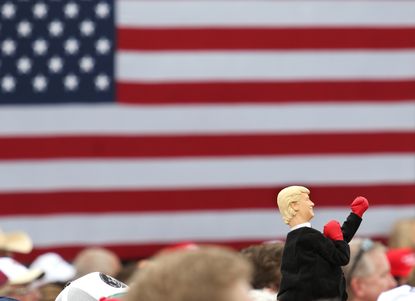Republican voters don't care about policy. They just want political blood.
This is why the conservative intellectual policy dream will never be realized


The American right could use a lot fewer talk-radio shouters and a lot more policy intellectuals. But that doesn't mean intellectuals are especially good at grasping what's going on in the minds of Republican voters.
Intellectuals of all stripes have spent a lot of time since Donald Trump rose to the top of the Republican primary field during the fall of 2015 trying to figure out just what's going on in the GOP. Many conservative intellectuals, especially the so-called "reformocons" who spent the Obama years trying to persuade Republican politicians that the party should espouse a more economically populist policy agenda, have tended to assume that Trump succeeded in winning the Republican nomination and then the presidency at least in part by rudely and clumsily tapping into a latent desire among GOP voters for economically populist policies.
But is it true?
Subscribe to The Week
Escape your echo chamber. Get the facts behind the news, plus analysis from multiple perspectives.

Sign up for The Week's Free Newsletters
From our morning news briefing to a weekly Good News Newsletter, get the best of The Week delivered directly to your inbox.
From our morning news briefing to a weekly Good News Newsletter, get the best of The Week delivered directly to your inbox.
Three of America's smartest right-of-center intellectuals certainly seem to think so. In a stimulating and thoughtful conversation, New York Times columnist Ross Douthat, Henry Olson of the Ethics and Public Policy Center, and Daniel McCarthy, the former editor of The American Conservative and the newly appointed editor of the quarterly journal Modern Age, discuss the future of the GOP and conclude that economic populism (and, in McCarthy's case, a shift toward realism and restraint in foreign policy) is where the party needs to go in trying to respond to the needs and desires of its base.
Where they disagree is mainly over the extent to which President Trump himself helps or hinders the cause of shifting the party away from zombie Reaganism (upper-income tax cuts with no direct help for the struggling working class; a reflexively hawkish foreign policy) and toward an agenda that would turn the GOP into something like the "workers party" that Stephen Bannon and Trump himself have exhorted it to become. But about the need for that shift they are very much on the same page.
A year ago — even as recently as a few months ago — I would have endorsed something like this view myself. But no more. The president's low-but-incredibly-stable approval ratings, combined with some recent in-depth opinion polls of Republican voters, show us that the GOP base is at once sharply divided about public policy and almost entirely indifferent to it. And this means that the Republican future that Douthat, Olson, and McCarthy hope to midwife is exceedingly likely to be stillborn.
How do we know this? Because the polls simply don't support the claim that Republican and Republican-leaning voters as a whole (or anything close to a whole) want their representatives to break from Reaganism and embrace an economically populist agenda. What the polls show is that the party is sharply divided, with between one-third and two-fifths of voters supporting a continuation of Reaganism (lower corporate taxes and lower taxes on household income over $250,000/year) and slightly more than half favoring the same or higher rates. The same sharp divisions show up on questions touching on immigration, free trade, and gay rights.
That's a portrait of a party lacking any consensus, across a range of policy issues, of what to do.
But how can that be, when President Trump continues to enjoy the approval of around 80 percent of Republicans? Given the deep fissures in the party over policy and Trump's decision to go along with Reagan-inspired tax cuts and efforts at stripping millions of their health insurance while breaking almost all of his more populist promises, you'd expect a much bigger chunk of the party to revolt: "Hey Orange Man, where's the massive infrastructure bill we were promised? And how about NAFTA repeal? Or that trade war with China?"
But we've seen nothing of the sort. The Republican electorate continues to like Trump — whether he's cheering for corporate tax cuts, or pushing (and failing) to dismantle ObamaCare, or trying (and failing, repeatedly) to impose a travel ban on Muslims from a continually shifting list of countries, or failing even to bring up the subject of infrastructure.
The only plausible explanation is that Republican and Republican-leaning voters don't particularly care about policy at all. What they care about is the only distinctive thing that Trump provides them — a potent and vicariously satisfying display of rhetorical animus directed against Democrats and their supposed enablers in the media, without any consistent or coherent link to a policymaking agenda.
It's all negative partisanship, all the way down.
As long as this remains true — and I see nothing that's likely to change the dynamic anytime soon — the debate about policy among conservative intellectuals will be beside the point. It will amount to intellectuals talking to each other about what should happen without anything like it actually happening. That's because doubling down on Reaganism won't unify and galvanize the party, and neither will Sens. Mike Lee and Marco Rubio co-sponsoring a big infrastructure bill.
The only thing that will unify and galvanize the party is red meat — flagrant and ever-more-rabid displays of raw partisanship in which Democrats and the media are treated like foreign invaders out to destroy all that is good and great about America.
That’s what President Trump gives them, and that’s all that Republican-style populism is ever likely to amount to.
Create an account with the same email registered to your subscription to unlock access.
Sign up for Today's Best Articles in your inbox
A free daily email with the biggest news stories of the day – and the best features from TheWeek.com
Damon Linker is a senior correspondent at TheWeek.com. He is also a former contributing editor at The New Republic and the author of The Theocons and The Religious Test.
-
 Why au pairs might become a thing of the past
Why au pairs might become a thing of the pastUnder The Radar Brexit and wage ruling are threatening the 'mutually beneficial arrangement'
By Chas Newkey-Burden, The Week UK Published
-
 'A direct, protracted war with Israel is not something Iran is equipped to fight'
'A direct, protracted war with Israel is not something Iran is equipped to fight'Instant Opinion Opinion, comment and editorials of the day
By Harold Maass, The Week US Published
-
 Today's political cartoons - April 17, 2024
Today's political cartoons - April 17, 2024Cartoons Wednesday's cartoons - political anxiety, jury sorting hat, and more
By The Week US Published
-
 Arizona court reinstates 1864 abortion ban
Arizona court reinstates 1864 abortion banSpeed Read The law makes all abortions illegal in the state except to save the mother's life
By Rafi Schwartz, The Week US Published
-
 Trump, billions richer, is selling Bibles
Trump, billions richer, is selling BiblesSpeed Read The former president is hawking a $60 "God Bless the USA Bible"
By Peter Weber, The Week US Published
-
 The debate about Biden's age and mental fitness
The debate about Biden's age and mental fitnessIn Depth Some critics argue Biden is too old to run again. Does the argument have merit?
By Grayson Quay Published
-
 How would a second Trump presidency affect Britain?
How would a second Trump presidency affect Britain?Today's Big Question Re-election of Republican frontrunner could threaten UK security, warns former head of secret service
By Harriet Marsden, The Week UK Published
-
 'Rwanda plan is less a deterrent and more a bluff'
'Rwanda plan is less a deterrent and more a bluff'Instant Opinion Opinion, comment and editorials of the day
By The Week UK Published
-
 Henry Kissinger dies aged 100: a complicated legacy?
Henry Kissinger dies aged 100: a complicated legacy?Talking Point Top US diplomat and Nobel Peace Prize winner remembered as both foreign policy genius and war criminal
By Harriet Marsden, The Week UK Last updated
-
 Trump’s rhetoric: a shift to 'straight-up Nazi talk'
Trump’s rhetoric: a shift to 'straight-up Nazi talk'Why everyone's talking about Would-be president's sinister language is backed by an incendiary policy agenda, say commentators
By The Week UK Published
-
 More covfefe: is the world ready for a second Donald Trump presidency?
More covfefe: is the world ready for a second Donald Trump presidency?Today's Big Question Republican's re-election would be a 'nightmare' scenario for Europe, Ukraine and the West
By Sorcha Bradley, The Week UK Published